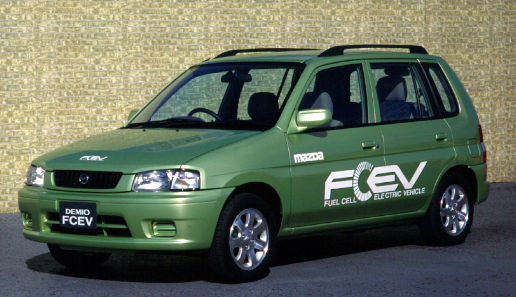| September 26, 1997 |
Mazda Develops Fuel Cell Electric Vehicle, "Demio FCEV"
-Next Generation Electric Vehicle Emits no Pollutant-
Mazda Motor Corporation announced today that it has developed a fuel cell electric vehicle, the Demio FCEV. The company will exhibit the Demio FCEV at "Eco Japan '97" under the auspices of the Ministry of International Trade and Industry and others, from December 5-9 in Kyoto, Japan.

Demio FCEV
The company intends to use the "Demio FCEV" as an experimental prototype to evaluate its driveability, control system and fuel efficiency. Maximum speed capability is expected to be 90km/h; the driving range is 170km per full charge of hydrogen.
The Demio FCEV uses the Mazda Demio, a small passenger car, as its base, powered by a fuel cell system which generates electricity through the electrochemical reaction between hydrogen and oxygen. The Demio FCEV's fuel cell system is composed of: a polymer electrolyte fuel cell stack to generate electricity; a metal hydride hydrogen storage tank to supply hydrogen into the fuel cell stack; a small air compressor to feed oxygen (air) into the fuel cell stack.
A characteristic of Mazda's fuel cell system is its compactness derived from elimination of the external air humidifier. The polymer electrolyte membrane should always contain water for its fuel cell operation. In the conventional polymer electrolyte fuel cell system, hydrogen and air are externally humidified. However, Mazda's fuel cell effectively uses water which is produced in the electro-chemical reaction process, and it eliminates the external air humidifier which normally occupies 15 percent of the volume of the fuel cell stack.
Mazda has also adopted an ultracapacitor, durable under repetitive use, which provides supplemental electricity by charging and discharging electricity required for acceleration.
The FCEV is considered to be the next generation electric vehicle with an on-board electric generator consuming hydrogen as a fuel, unlike conventional electric vehicles with an on-board battery to store energy. The fuel cell emits only water as a byproduct of the electro-chemical reaction. No CO2 and NOx are emitted since the source of fuel is hydrogen, and no combustion activity is involved. Furthermore, higher efficiency in energy conversion is achieved when compared with conventional internal combustion engines since there is less heat loss.
Currently, several major automakers are developing fuel cell electric vehicles, expecting it to become one of the promising alternatives to replace gasoline-powered vehicles.
Mazda has been studying the application of hydrogen for a long time, as seen in the hydrogen rotary engine and fuel cell. On top of that, the company is developing other environment-friendly technologies such as technology to reduce CO2 emissions, alternative-fuel and clean-energy vehicles, recycling materials and resources.
Part of the research and development work of the fuel cell system is carried out under financial support from the Agency of Industrial Science and Technology, the Ministry of International Trade and Industry.

Motor room

Demio FCEV
